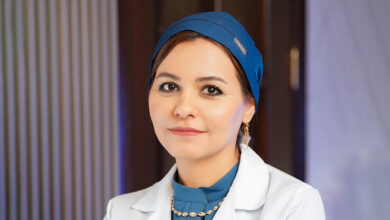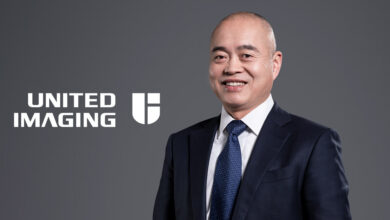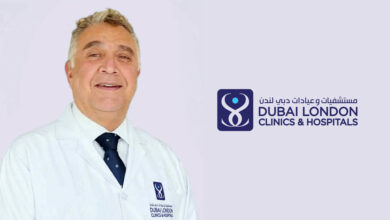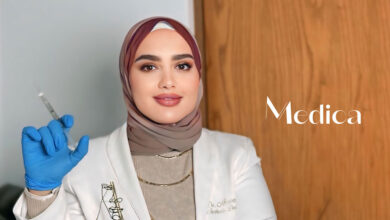Leadership in Action – Building the Future of Healthcare
With over two decades of experience in global healthcare and an unwavering commitment to innovation, Hein van Eck is at the helm of Mediclinic Middle East, steering one of the UAE’s most respected healthcare providers into a new era. From his early career as a healthcare actuary in South Africa to leading one of the region’s largest healthcare ecosystems, Van Eck’s journey is rooted in data-driven decision-making and people-centered care. In this exclusive interview with Hospitals Magazine, he discusses Mediclinic’s expansive vision, the integration of AI and digital health, and the Middle East’s unique position to lead global transformation in healthcare delivery.
Mr. Van Eck, can you tell us about your background and your journey to becoming CEO of Mediclinic Middle East?
I’m from South Africa, my accent usually gives that away quickly. I started my career as a healthcare actuary, initially working on the insurance side of the industry. Back in 2005, I was part of a team that negotiated provider tariffs, which led me to encounter Mediclinic. They eventually offered me a role, and I’ve now been with the organization for 20 years. I moved to the Middle East in 2014 to support the development of insurance pricing, analytics, health policy, and revenue cycle management. I’ve been in my current position as CEO for two years now, and it’s been an incredibly rewarding experience.
How do you view the current healthcare landscape in the Middle East?
It’s an exceptionally exciting time for healthcare in this region. One of the biggest advantages here is the absence of legacy systems that often hinder innovation elsewhere. In many parts of the world, introducing new technologies can be challenging due to regulatory inertia and entrenched systems. In contrast, the Middle East is forward-looking, with governments that embrace innovation and digital transformation. The willingness to implement AI and data-driven systems, combined with agile governance, is propelling the region ahead, and I believe it will soon outpace many global healthcare systems in areas like Artificial Intelligence and machine learning.
Where does Mediclinic position itself in this dynamic market?
Mediclinic is part of a leading international healthcare group with operations in Switzerland, South Africa, and of course, the Middle East. Here in the UAE, we’ve built a comprehensive ecosystem across the continuum of care; with 7 hospitals and 29 clinics. But it doesn’t stop there: we’re involved in IVF through our Bourn Hall brand, home-based care, telemedicine, home dialysis, and even command center-style patient coordination through our Care Collaboration Centre. Our strategic focus is personalization, offering tailored clinical and administrative experiences for our customers, not just our patients. We believe in being a healthcare partner for individuals across all stages of health, including when they’re well.
So, personalized care is the foundation of Mediclinic’s future?
Absolutely. Personalized care, supported by advanced AI, is the future. We’re entering a phase where lab testing will become more affordable and accessible, and AI will assist, or even lead clinical decision-making. Family medicine, while irreplaceably human in many ways, will increasingly benefit from AI support. We aim to proactively serve patients based on their preferences, medical history, and behavioral data, instead of sending standard communications. It’s about relevance, convenience, and outcomes.
How has the transition from Chief Strategy Officer to CEO changed your perspective?
It’s been a whirlwind – challenging, but incredibly energizing. I’ve been fortunate to work alongside an exceptional team. I’m naturally collaborative, and I don’t pretend to have all the answers. But I do know the right questions to ask and when to rely on the data. One of the biggest differences is the breadth of responsibilities that come with the CEO role. The data-driven mindset that I developed as an actuary continues to serve me well, especially when navigating complex decisions. You don’t always have perfect data, but knowing how to evaluate it and when it’s sufficient to act is key.
Can you share examples of how Mediclinic is using AI to enhance operations?
One standout case is our “no-show bot,” developed using the DataRobot AI platform and UiPath automation. No-shows—patients who book appointments and don’t arrive—are a major issue in healthcare. Our predictive model analyzes patient behavior to estimate the likelihood of attendance with up to 96% accuracy. This allows us to free up appointment slots, optimize scheduling, and ultimately reduce waiting times for others. It’s a great example of how AI can solve real-world healthcare inefficiencies.
And how has Mediclinic scaled its digital health infrastructure post-COVID?
COVID was a turning point. We significantly expanded our digital health strategy. Today, our Care Collaboration Centre—essentially a command hub staffed by doctors and nurses remotely monitors hundreds of chronic patients. During COVID, we cared for over 1,000 elderly patients remotely. Today, we’re still managing around 500 patients this way. We conduct about 20,000 teleconsultations and nearly 100,000 online bookings monthly. Digital health is now deeply embedded in our ecosystem, from virtual consults to home care, pharmacy delivery, and in-home doctor visits. But we’re also focused on seamless Integration – digital health must complement physical care, not replace it.
Has demand for telemedicine remained steady post-pandemic?
It has come down, but settled at a higher base than pre-Covid levels and continued increasing over time. While in-person consultations remain the preferred choice for many, telemedicine has found a strong niche, particularly for chronic and follow-up cases. We use it strategically where it enhances convenience without compromising care. That said, widespread adoption also depends on reimbursement models. Currently, teleconsultations are reimbursed at about half the rate of physical ones. Closing that gap would incentivize broader adoption.
How does Mediclinic balance growth and innovation with maintaining high standards of care?
Quality is deeply rooted in our DNA, thanks to our founder, Dr. Edwin Hertzog. His philosophy still guides us: when a doctor is with a patient, the only focus should be on quality care. Only outside that consultation room should we consider financial sustainability, efficiency, or business concerns. That principle allows us to act ethically, even when insurance coverage is limited. We provide care first, because it’s the right thing to do.
What are the key challenges facing the healthcare sector in the region?
Margin squeeze is a pressing issue, rising costs, pricing pressures, and increasing competition make efficiency critical. AI and automation offer tremendous potential to reduce administrative overhead. Another challenge is managing the influx of new technologies. Every day, we receive proposals from tech companies pitching innovations. Evaluating and integrating the right ones without missing the next breakthrough, is a constant balancing act.
What role does Mediclinic play in supporting the UAE’s healthcare strategy?
We are proud to be a long-term partner in the UAE’s healthcare ecosystem. We work closely with the government on initiatives such as emergency preparedness, organ transplantation, and the promotion of digital and virtual health. We’ve performed over 70 kidney transplants and are strong advocates for primary and preventative healthcare. However, the funding model for primary care still needs to evolve to better incentivize its utilization. Formalizing that structure will be key to long-term sustainability.
Sustainability is an important aspect of modern healthcare. How is Mediclinic addressing environmental responsibility?
We’re deeply committed to sustainability. During COP28, two of our hospitals received the Department of Health’s Emerald Award for environmental excellence. We’re implementing solar panel infrastructure, using clean energy across our campuses, and recycling tens of thousands of liters of water daily from our air conditioning systems, used for irrigation and cleaning. Sustainability is not a side project; it’s an operational priority.
How does your participation in Abu Dhabi Global Health Week align with Mediclinic’s mission?
This event resonates strongly with our vision. We’re proud to be long-standing partners with the Department of Health, and the caliber of speakers and participants here is world-class.
The conference reflects where UAE healthcare is headed, and we’re proud to help shape that future.
What upcoming initiatives can we expect from Mediclinic?
We’re continuing to grow. We’re investing AED 120 million into expanding Mediclinic Airport Road Hospital, adding operating theatres and 50 more beds to meet increasing demand. That facility is evolving into a major healthcare campus. We’re also looking to expand some of our other hospitals by nearly 50% and are exploring new hospital opportunities. We’ll be announcing more details later this year, inshallah.
Finally, what advice would you give to aspiring healthcare leaders entering the industry?
First, take the time to understand the Big picture, how healthcare systems function, how regulators think, and how policies are shaped. Healthcare is incredibly complex, and leaders need to be informed across all levels. Second, stay connected to the ground. Don’t just rely on PowerPoint presentations. Visit clinics. Talk to staff. Observe patients. The reality on the ground often tells a more accurate story than the boardroom ever will. It’s a lesson I live by every day.















